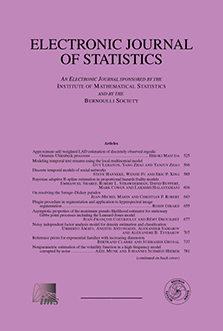Abstract
A solution manifold is the collection of points in a d-dimensional space satisfying a system of s equations with . Solution manifolds occur in several statistical problems including missing data, algorithmic fairness, hypothesis testing, partial identifications, and nonparametric set estimation. We theoretically and algorithmically analyze solution manifolds. In terms of theory, we derive five useful results: smoothness theorem, stability theorem (which implies the consistency of a plug-in estimator), convergence of a gradient flow, local center manifold theorem and convergence of the gradient descent algorithm. We propose a Monte Carlo gradient descent algorithm to numerically approximate a solution manifold. In the case of the likelihood inference, we design a manifold constraint maximization procedure to find the maximum likelihood estimator on the manifold.
Funding Statement
Supported by NSF grant DMS 2112907 and DMS 195278 and NIH grant U24 AG072122.
Citation
Yen-Chi Chen. "Solution manifold and its statistical applications." Electron. J. Statist. 16 (1) 408 - 450, 2022. https://doi.org/10.1214/21-EJS1962





